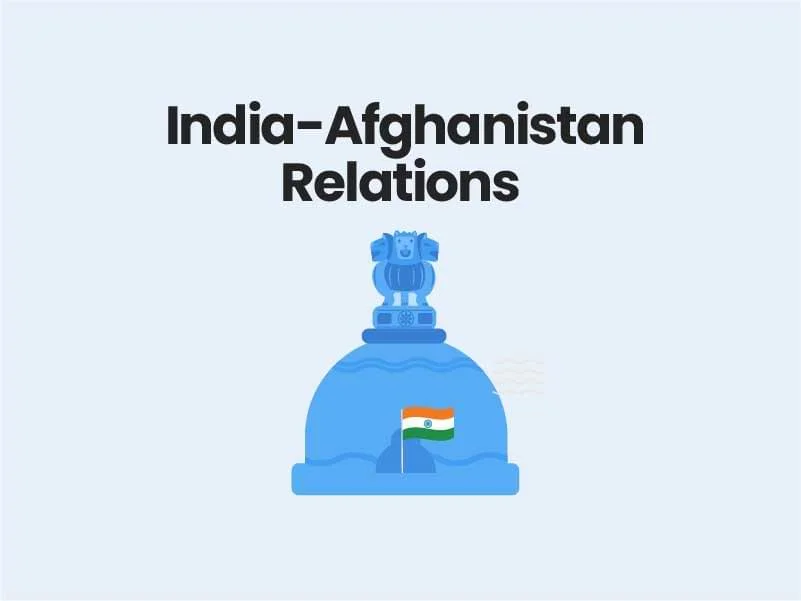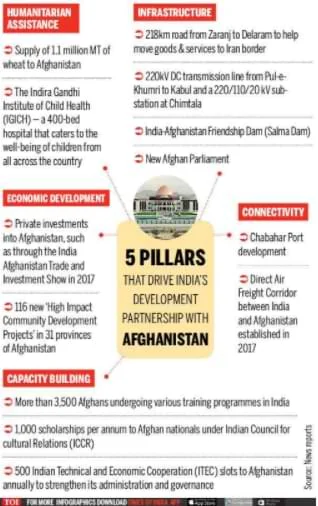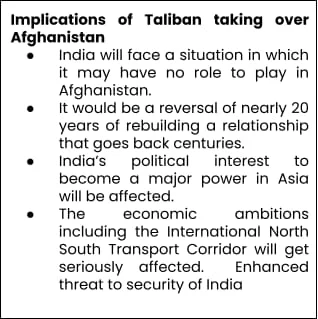
India-Afghanistan Relations
India and Afghanistan have a strong relationship based on historical and cultural links. India was among the first non-Communist states to recognize the government installed by the Soviet Union after its 1979 invasion of Afghanistan and also supported successive governments in Kabul until the rise of the Taliban in the 1990s. Like most countries, India never recognized the Taliban’s assumption of power in 1996 (only Saudi Arabia, Pakistan, and the United Arab Emirates recognized the Taliban regime).
- Following the 9/11 attacks and the U.S.-led war in Afghanistan that resulted, ties between India and Afghanistan grew strong once again and thus India restored full diplomatic relations and has provided hundreds of millions of dollars in aid for Afghanistan’s reconstruction and development.
Importance of Afghanistan for India Geostrategic Importance:
- For India, Afghanistan is geostrategically extremely critical in terms of outreach to the Central Asian Republics (CAR).
- Afghanistan shares a border with India’s Pakistan Occupied Kashmir (PoK).
- Counterbalance to Pakistan: Afghanistan has been the battleground for an India-Pakistan proxy war since 2001 and India needs Afghanistan to get a better view of Pakistan and hence it is pertinent that it fosters positive relations.
- Afghanistan also denies strategic depth to Pakistan.
- The Pakistan-Afghanistan border remaining active denies Pakistan the opportunity of positioning additional military capabilities along its borders with India.
- India as a Major Power: India’s ability to mentor a nascent democracy will go a long way to demonstrate to the world that India is indeed a major power, especially a responsible one.
- Economic and Political Aspects: Afghanistan not only serves security and economic interests but is also closely tied to India’s vision of being a regional leader and a great power, coupled with its competition with China over resources.
- The gas pipeline project TAPI (Turkmenistan-Afghanistan-Pakistan-India), which seeks to connect an energy-rich Central to South Asia is a major project concerning India.
- Afghanistan promises its deposits of energy raw materials and high-value mineral deposits.

Indo-Afghan Bilateral Relations at a Glance
- In the recent past, India-Afghanistan relations have been further strengthened by the Strategic Partnership Agreement (SPA), which was signed between the two countries in 2011. India has employed a soft-power approach in Afghanistan.
- Commercial Relations: India has been a natural trading partner for Afghanistan and is the largest market in South Asia for its products. The total bilateral trade between India and Afghanistan for the year 2019-20 was at US Dollar 1.5 billion which has grown with the establishment of an air freight corridor in 2017. The balance of trade is heavily tilted in favor of India.
- Defense Ties: So far India has trained Afghan military personnel and gifted four military helicopters to the Afghan government as per the terms of the accord. On the other hand, India has not sent troops to Afghanistan during the two-decade-long stay by US-led international troops given that groups within the Pakistan-backed Taliban like the Haqqani network have in the past targeted Indian consulates as well as the Indian embassy in Kabul.
- Assistance for Different Projects with Vested Interests The SPA committed Indian assistance to help rebuild Afghanistan’s infrastructure and institutions, education and technical assistance for capacity-building in many areas, encourage investment in Afghanistan, and provide duty-free access to the Indian market
- Salma Dam: Also known as the Afghan-India Friendship Dam, the dam in Herat province was completed against many odds and inaugurated in 2016.
- Zaranj-Delaram Highway: The 218-km highway built by the Border Roads Organisation is of strategic importance to New Delhi, as it provides an alternative route into landlocked Afghanistan through Iran’s Chabahar port since Pakistan denies India’s overland access for trade with Afghanistan.
- Zaranj is located close to Afghanistan’s border with Iran.
- Parliament: The Afghan Parliament in Kabul was built by India at US Dollar 90 million.
- Stor Palace: The Aga Khan Trust for Culture completed the restoration of Stor Palace in Kabul, originally built in the late 19th century, and which was the setting for the 1919 Rawalpindi Agreement by which Afghanistan became an independent country. India has also contributed to the power, health, and education infrastructure in Afghanistan.
India in Afghan Peace Talks
- So far the Indian involvement in Afghanistan has been centered on the needs of the people of Afghanistan and these have been in consultation with Afghanistan’s elected government.
- India has held the position that any peace process should be Afghan-led, Afghan-owned, and Afghan-controlled.
- India is also part of the Heart of Asia Conference which aims at settling the Afghan Crisis.

India’s Change in Character in Peace Talks
- In the 1990s and 2000s, India was steadfastly opposed to any dealings with the Taliban.
- Later its position seems to have evolved over the years. In 2018, when Russia hosted Afghan and Taliban talks, India had sent a diplomatic delegation to Moscow.
- India also attended the inaugural session of Intra-Afghan Peace Talks at Doha in 2020.
- The evolution of India’s position is in sync with the evolution of the reality in Afghanistan with China, Russia, and the US reaching out to the Taliban for peace.
Way Forward for India
- To seek peace in Afghanistan, there must be clarity on the kind of ‘end state’ that Afghans, as well as Afghanistan’s regional and international stakeholders, would accept.
- In the end, the key is to achieve peace within the Islamic Republic of Afghanistan — a system that is defined by its core values related to human rights, women’s rights, democracy, rule of law, and political inclusion.
- So far, to a large extent, India has been out of Afghan talks, where in contrast, Pakistan has played a pivotal role like the recent Troika Plus Meet. Thus India needs to be present in future multilateral talks and chalk out its strategy in consort with the elected government at Kabul.
- India needs to accept the Taliban and keeping out of the talks will erode our presence in the West Asian strategic space.
Read 2021 UPSC Mains Full Questions

